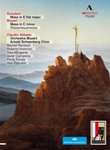|
Back
12/05/2013
Franz Schubert: Mass No. 6 in E flat major, D.950
Wolfgang Amadeus Mozart: Mass in C minor, K.139
Rachel Harnisch (soprano), Roberta Invernizzi (soprano), Sara Mingardo (alto), Javier Camarena (tenor), Paolo Fanale (tenor), Alex Esposito (bass), Orchestra Mozart, Arnold Schoenberg Choir, Erwin Ortner (chorus master), Claudio Abbado (conductor)
Recorded at the Haus für Mozart, Salzburg (July 28, 2012) – 104’27
Accentus Music ACC10261 (or DVD ACC20261) – Picture format: 16:9 NTSC Full HD – Sound format: dts-HD Master Audio, PCM Stereo – Subtitles in Latin, English German, French, and Korean – Blu-ray disc with booklet essays in English, German, and French

   
This enticing release captures a most momentous occasion: Claudio Abbado’s return to the Salzburg Festival after a 10 year absence. The Italian maestro, now more frail due to health issues, brought with him his hand-picked Orchestra Mozart for two religious pieces. Combined with the impeccable Arnold Schoenberg Choir, the single performance, captured live here, bubbles with occasion but soars with inspired musicality.
Among the most impressive aspects of this performance is the balance Abbado achieves between expressivity and historically-informed performance practice. The relatively small forces achieve a chamber-like ensemble, not just across the orchestra, but between orchestra, chorus, and soloists. Phrasing is uniform across the groups and the results are breathtaking. These two works are performed with the utmost attention to textual detail and rhetorical flow.
To be sure, this applies primarily to the more colorful Schubert Mass than the Mozart, but even the “Waisenhaus” Mass, an early piece, sears with dramatic shadings of his still to come “Great Mass” and Requiem. In Abbado’s hands, the Mozart is elevated to a piece of serious contemplation and reverence without losing the effervescence of Mozart’s youthful spirit. Tempi are invigorating, and the proficiency of the players and singers dispatch Mozart’s declamatory phrases with refinement.
Abbado takes a much more expansive approach to Schubert’s final mass and the results are magnificent. Schubert’s sumptuous harmonies are expressively formed by the forces while still performed with control and rhythmic vitality. While the “Gloria” seemed to be a tad restrained, the majesty of the sound is quite stunning. The organ-like sonorities of the choir consistently impart the text with oratorical power while maintaining superb technique. If anything, their sound is too perfect.
Combined with the Orchestra Mozart, the beauty of the total sound is stunning. Strings are liquid, supremely legato while maintaining a warm straight tone. The interplay between the woodwinds and chorus is breathtakingly taught, particularly in the Schubert. The soloists are all quite satisfactory, with soprano Roberta Invernizzi leading the way in the Schubert with sumptuous tone. Tenor Javier Camarena sings here with an expressive quality underpinned by a solid lyric-tenor technique. Soprano Rachel Harnisch contributes wonderfully in the Mozart with a sparkling and agile voice. Alto Sarah Mingardo has an earthly but fresh voice and Alex Exposito a youthful, sonorous bass. Tenor Paolo Fanale has a dark hue which provides a wonderful contrast to Camarena in the Schubert. Their Germanic-Latin diction is impeccable, as is the chorus’.
Picture quality is outstanding with some of the finest contrasts I've seen in a live concert picture. Camera work is outstanding and interestingly done, although the segues between movements focus on details of famous religious artwork. This tends to disrupt the focus of the performance. The surround sound is very detailed and the transparency of the ensemble is pristinely captured on a packed soundstage.
In the end, it is Abbado who shines through. Never a conductor to make a show about himself, he conducts from memory with earnest gestures that result in a spontaneous flow to the music. Some of the tempi in the Schubert, particularly the "Gloria," are on the slow side, but the expressively of the results are beyond reproach. Abbado's innate musicality and sheer joy of music making inspire his musicians to give a spectacular performance—highly recommended.
Matthew Richard Martinez
|